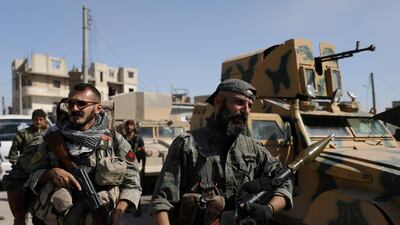Regional governments are responding with caution to a reported plan for an "Arab force" in Syria, and are discussing multitude of options such as a training task force to deploy in the east of the country and share the military burden with Washington.
The Wall Street Journal reported on Monday that "the Trump administration is seeking to assemble an Arab force to replace the US military contingent in Syria and help stabilise the north-eastern part of the country". It also revealed that Erik Prince, the private military contractor and founder of Blackwater, "has been informally contacted by Arab officials about the prospect".
But Arab sources familiar with the planning in Washington told The National that "discussions are still very early" and "nothing is yet clear or final". Current options include creating a training hub for Syrian Democratic Forces or embedding trainers from the Islamic coalition with those troops in eastern Syria instead of sending a full force to the country.
The plan itself is not entirely new and has been partially floated at both the Arab League meeting and the Camp David summit in spring 2015. Then, the Obama administration and its Arab partners planned to form a 40,000 troop-force modelled after the quick-response contingent for Nato and aimed mainly in their case at countering Iran.
_______________
Read more:
Trump at odds with Mattis on Syria military response, report
US in Afghanistan: Mattis confirms Trump administration has decided on new strategy
_______________
With Mr Trump and his national security adviser John Bolton showing more eagerness to both counter Iran regionally and speed up the exit of 2000 US forces personnel from Syria, those ideas are gaining more steam.
Mr Bolton is spearheading the effort according to the same sources. The new national security adviser is leading the strategy planning on Syria and made phone calls to his counterparts in Egypt and the Gulf at the weekend.
Last July, he wrote in The Wall Street Journal that "the US should press Egypt, Jordan and the Gulf monarchies for more troops and material assistance in fighting ISIL".
“America has carried too much of the burden... getting fresh contributions from Arab allies would rebalance the opposition, which is especially critical if the US turns away,” Mr Bolton said.
He went as far as calling for new borders in Syria and Iraq, declaring that “pining for borders demarcated by Europeans nearly a century ago is not [a US option]”.
Mr Trump agrees with Mr Bolton on the burden-sharing part. On Friday he said “increased engagement from our friends, including Saudi Arabia, the United Arab Emirates, Qatar, Egypt and others can ensure that Iran does not profit from the eradication of ISIL”.
But the Arab response has been cautions so far. Saudi foreign minister Adel Al Jubeir confirmed on Tuesday that Riyadh is “in discussion with the US and have been since the beginning of the Syrian crisis [2011] about sending forces into Syria”.
Mr Al Jubeir said sending forces from the Islamic military counter-terrorism coalition was on the table. The coalition includes 41 countries and was formed in 2015.
The discussions involve “what kind of force needs to remain in eastern Syria and where that force would come from, and those discussions are ongoing”, he added. Neither the UAE nor Egypt or other countries in the discussions have commented publicly.
Experts remained sceptical of the plan, but not all doomed its prospects.
“It is unrealistic,” Faysal Itani, an expert on Syria at the Atlantic Council’s Rafik Hariri Centre, said.
"These Arab states lack the military capacity to garrison an area controlled by the Kurdish PYD party – an ambivalent partner at best – and surrounded by enemies including the Syrian regime, a pro-Iranian Iraq and above all Iran itself," Mr Itani told The National. He also argued that the "Gulf militaries do not want to own the Syria problem or indeed shoulder any serious risks there".
Andrew Tabler, a fellow at the Washington Institute for Near East Policy, told The National that the plan is "not entirely unrealistic".
“When you look at eastern Syria, at the tribal areas, where some of those tribes overlap with the tribes of the Arab gulf” thus “giving them sway in that region”, he said.
"Unless Arab countries learn how to fight and hold territory, it is hard to see how they can successfully push back against Iran," he said, but cautioned that the discussions are still very early.
Others, such as Nicholas Heras of the Centre for a New American Security, pointed to those countries' own difficulties that would limit their participation in a military deployment in Syria. For Saudi Arabia, it is the Yemen war, and for Egypt, it is Sinai and the Nile Valley. "Egypt has the manpower to send a force, but it does not have the willpower to do so," Mr Heras told The National.
This could create an opportunity for private military contractors such as Mr Prince to wade into the battle. “Hiring private military contractors to assume most of the burden of working with the SDF in northern and eastern Syria could make a lot of sense for the Trump administration,” said Mr Heras. “Private military firms have deep experience operating in war zones and fragile state, or in the case of the SDF zone, statelets.”
Mr Prince told The Wall Street Journal that "the entirety of US mission in Syria can be outsourced at zero cost to the US taxpayer and zero risk to American service personnel". His previous plan to privatise the war in Afghanistan was dismissed by the White House last year.


